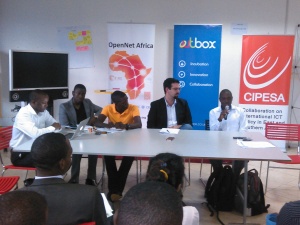You are here
Add new comment
CIPESA - Outbox Engagement: Digital Safety and Security Tools Testing
Submitted by sopio on 10 June 2015 - 10:10am
Since the beginning of 2015, the Collaboration on International ICT Policy for East and Southern Africa (CIPESA, www.cipesa.org) has been working in partnership with local tech communities in Kenya, Uganda, Tanzania, Rwanda, Burundi and Ethiopia to generate an empirical understanding in an [East] African context, of online safety and security technologies for ICT/internet users in the region.
Each tech institution is working together with CIPESA to bring together various competencies and networks to address the various internet freedoms challenges faced in the region.
The partnerships are in the context of CIPESA’s OpenNet Africa initiative (www.opennetafrica.org) which is aimed at promoting internet freedom in the region through digital security and safety skills development, creating awareness on the status of online freedoms and how to protect them, building a network of the region’s actors in this domain, and advocacy to engender a more progressive digital rights regime in East Africa.
OpenNet Africa is supported by the Humanist Institute for Co-operation with Developing Countries (Hivos), the Open Technology Fund (OTF) and the Citizen Lab at the University of Toronto.
Tools Testing in Uganda
As part of the initiative’s 2015 strategy, Outbox Uganda LTD has been working with the local tech community to test select digital safety and security tools to understand what works well and why and what might need change.
Three teams including Tech4Dev, Ghost in the Wires and African Value participated in this project with mentorship from mentors for a period of 6 months.
The tested tools included those developed by the Open Technology Fund:
- Cyrptocat
- Mailvelope
- Martus
- TextSecure
- Redphone
Scope of testing
1. The tools strengths, weaknesses and opportunities to make them work better in a Ugandan/EA context for safety and security of online users.
2. The tools ability to enable annonymisation, circumvention, privacy and freedom of expression taking into consideration - different types of users, particularly
vulnerable user groups:
- Youths
- Women
- Bloggers
- Journalists
- Human rights defenders/activists
- LGBT
3. The nature of threats in the region - censorship, terrorism, surveillance, electioneering etc
4. Internet access speeds and availability; ICT and education literacy levels in East Africa
5. Other considerations included aesthetics - colours, language, icons etc
Outcomes
- 8 weeks mentoring and support for 3 teams including.
- Team test findings reports on atleast 3 of the tools each.
- Pitching event of findings/reports – June 2, 2015 to showcase the test/familiarisation findings and localisation ideas to make the tools better. Judges to determine participants with the best findings and localisation recommendations for prizes.
The Judges
Wilson Abigaba – Internet Society Uganda Chapter
Neil Blazevic – Pan Africa Human Rights Defender’s Project
Mark Kiggundu – East and Horn of Africa Human Rights Defender’s Project
Richard Lusimbo – Sexual Minorities Uganda
Baldwin Okello – Uganda Telecom (UTL)
CIPESA
OutBox
Prizes
Modest prizes and the opportunity to advance to localisation during the second half of 2015.
3rd Place - $200 and localisation support
2nd Place - $250 and localisation support
1st place - $300, localisation support and the opportunity to participate in an OpenNet Africa digital safety and security training event in another country (Kenya, Tanzania, Rwanda or Burundi) – all expenses paid.
Tech4Dev, Ghost in the Wires and African Value won the 1st, 2nd and 3rd positions respectively.


